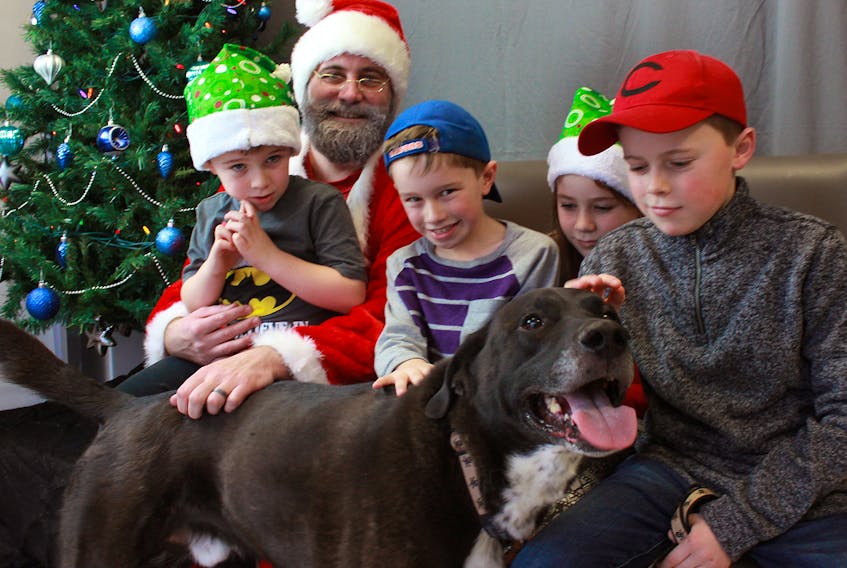CHARLOTTETOWN, P.E.I. - Blood isn’t just in humans to give.
And Garth, a mixed lab, is a prime canine example of that.
The six-year-old dog has donated blood 25 times at the Atlantic Veterinary College to help other canines make it through surgeries, disease and injuries.
While the dog blood donor program may be largely unknown to most Islanders, despite existing at the AVC since its establishment in 1986, program co-ordinator Andrea Jack said the hospital has lots of canine patients who require blood.
“We keep some stock in the hospital, and it really varies depending on the usage of blood products in the hospital. Usually at least once a month we have a dog coming in to donate blood,” said Jack.
Garth and other canines involved in the program, as well as their owners, were thanked for their participation during a Christmas social at the AVC on Saturday. The event saw pups get a picture taken with Santa and get treated with some cookies and protectives for internal parasites, flea ticks and heartworm.
“Today is about saying thank you to our donors,” said Jack.
“We keep some stock in the hospital, and it really varies depending on the usage of blood products in the hospital. Usually at least once a month we have a dog coming in to donate blood.”
-Andrea Jack
The day was also an opportunity for donors and owners to get information on changes to the program, especially the expansion to also now include fecal donations.
“Just like the human world that’s moving towards things like fecal transplants to restore bacteria in the intestinal tract to a healthy status, we’re going to start doing that with some of our canine patients,” said Jack.
Jack said fecal transplants will be used in co-ordination with the AVC’s other therapies to help treat a variety of intestinal illnesses, like inflammatory bowel disease.
“And try to help those dogs bounce back a little quicker,” she said.
Jack said the process for canines giving blood is just like with humans, with the AVC even using the exact same collection service as Canada Blood Services.
Dogs are brought into a room and lay on a table before a needle, also the same used on humans at Canada Blood Services, draws blood from their neck.
Most dogs are good and calm during the procedure, said Jack.
“Usually I give them enough cookies afterwards that they’re pretty forgiving,” she said.
Those interested in having their dog participate in the AVC Canine Donor program can fill out a registration form at the school.
Donors must be at least 50 pounds, happy, healthy and less than eight years of age. They also must be neutered, not on a raw food diet, have never received a transfusion and not currently on any medications other than flea, ticks and heartworm preventatives.
[email protected]
Twitter.com/Mitch_PEI









